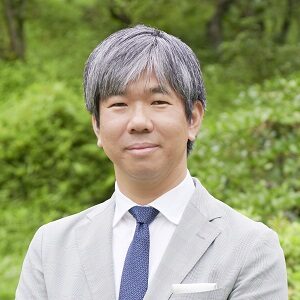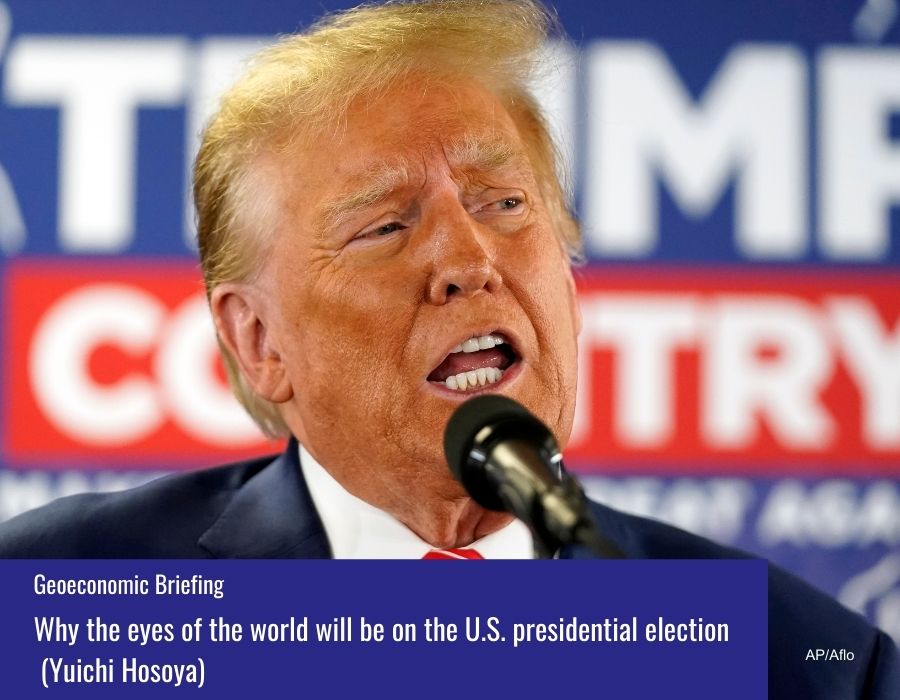Geoeconomic Briefing No.177 February 8, 2024
Why the eyes of the world will be on the U.S. presidential election
Director
Director of Research, Asia Pacific Initiative
Group Head, Europe & Americas, Institute of Geoeconomics
The whole world is now intimidated by American democracy. The Economist expressed concern over the possible outcome of the U.S. presidential election on Nov. 5 in an article published on Nov. 16 last year, titled “Donald Trump poses the biggest danger to the world in 2024.” Eurasia Group, a U.S.-based research firm, announced on Jan. 8 its top 10 risks in the world for 2024, ranking “the United States vs. itself” as the biggest risk.
It is forecasting that the United States will be rattled by confrontations within its own society, which will become even more inward-looking and divided, rather than taking action as a responsible global superpower against Russia, which continues to attack Ukraine, and China, which is boosting its authoritarianism, as well as over the deepening chaos in the Middle East. Such a situation will pose a devastating threat not only to U.S. democracy but also to the future of liberal international order.
This year will be a year of elections, with voting scheduled in more than 70 countries around the world and more than 3 billion people going to the polls to decide the future of politics. After the Taiwan presidential election took place on Jan. 13, there will be a presidential election in Indonesia on Feb. 14 and one in Russia on March 17. Many other major countries that are members of the Group of 20, including South Korea, India and Mexico, as well as the European Parliament are expected to hold elections to determine the future of their administrations. And, as mentioned previously, the most important election to focus on is the U.S. presidential election. The election is highly likely to be a “rematch” between 81-year-old Joe Biden, the incumbent president, and former President Donald Trump — who will be 78 at the time of the poll — who refused to concede that he lost the 2020 election and continues to challenge democratic values and systems.
Trump gaining momentum
Results of opinion polls held at this stage do not have much meaning in forecasting the outcome of the election, but according to Chicago-based independent political news and polling data aggregator Real Clear Politics, Trump had an average support rate of 63% in opinion polls as of Jan. 4, holding an overwhelming lead over his rivals for the Republican presidential nomination. Furthermore, many opinion poll results show Trump has the upper hand even over Biden, with the latter’s approval rating being exceptionally low for a sitting president.
Trump’s presidency ended after one term in office when he lost in the previous election four years ago. Some experts say the low support rate for Biden is a sign that he could follow the same path as his predecessor. On Jan. 6, 2021, the world was shocked to see a mob of Trump supporters storming the U.S. Capitol in Washington, leaving democracy — whose core value is a peaceful transition of power — hanging by a thread.
Since then, China’s Communist Party-led administration has repeatedly been broadcasting footage of the incident — in which a crowd flooded into the building and engaged in violence that even led to the deaths of some people — in an effort to boast the stability of its own political system and attack the democratic political system of the U.S.
On Jan. 5 this year, nearly three years after the incident, Biden made a speech in the suburbs of Philadelphia and strongly criticized Trump, saying, “He’s willing to sacrifice our democracy to put himself in power. Philadelphia is sacred ground where the U.S.’ Declaration of Independence was made, and where the American democracy of today was designed.
Not only that, the state of Pennsylvania, where Philadelphia is located, has in recent years become one of the so-called swing states — those in U.S. presidential elections that could potentially be won by either candidate, important states that could determine the outcome of the elections. Amid concerns from voters over the president’s age, Biden said on Dec. 5, “If Trump wasn’t running, I’m not sure I’d be running.”
“We cannot let him win,” the president said, expressing determination to strive for his party’s nomination and positioning Trump as a danger to democracy itself. John Bolton, who served as national security adviser to Trump during his presidency, warned in an interview with weekly magazine Toyo Keizai in its Dec. 23-30 issue that Trump might do irreparable damage to the country if he returns to the White House.
Bolton pointed out that Trump has often told his supporters that he would be their retribution if re-elected, and that all his political motivations are driven by personal revenge. He also said Trump does not understand the rule of law, and argues everything that happens to him is unfair and political, and claims he has been persecuted. Such actions undermine the political system of conducting congressional politics based on the U.S. Constitution, Bolton said.
Even more concerning is the fact that such political views are not exclusive to Trump, but are also widely held among Republican voters. According to an opinion poll conducted by CNN in August, 69% of Republicans and Republican-leaners said Biden’s 2020 election win was not legitimate, indicating that the 2021 attack on the Capitol by Trump’s supporters has resulted in creating a deep divide within American citizens.
Impact on Japan and international order
The deep divide within America’s diplomacy has extended beyond the U.S. The future of politics in the U.S., the world’s biggest military and economic power, could cast a giant shadow over international order and also over the Japan-U.S. relationship. If Trump wins the presidential election, completely shifts the Biden administration’s policy of supporting Ukraine and withdraws assistance, and even hints at a move to eventually withdraw from NATO, the international community will be thrown into turmoil.
And if Trump approaches Chinese President Xi Jinping — as he did in the past with North Korean leader Kim Jong Un for personal and tactical advantage — it could have a grave impact on the stability of the Taiwan Strait. Bolton criticized Trump, saying he doesn’t understand the significance of allies. When he was president, Trump always regarded Japan-U.S. relations only from the perspective of trade imbalance, and repeatedly criticized Tokyo. He has often expressed deep skepticism about the value of Washington’s alliances, claiming that allies are stealing money away from American taxpayers by not spending enough on defense, thus making the U.S. weaker.
If Trump withdraws the U.S. from NATO, greatly damages the Tokyo-Washington alliance and shifts the U.S.’ security engagement in Ukraine and Taiwan, new crises could arise in Europe and the Indo-Pacific region. Many senior officials who played a central role in the Trump administration’s diplomatic and defense policies began to clearly distance themselves from Trump following the Capitol attack. Concerns are growing over the fact that there appear to be very few experts or former senior officials who can both be trusted and serve as Trump’s diplomatic and defense policy advisers.
Two future scenarios
There are two possible scenarios for international order and the future of Japan-U.S. ties if Trump wins the election. The first is for Japan to build as close a relationship as possible with Trump himself, as former Prime Minister Shinzo Abe did, to conduct summit diplomacy and propose policies to guide Trump’s actions from within, so to speak. For instance, the Abe administration globally advocated the Free and Open Indo-Pacific initiative from August 2016 onward. When Trump met Abe during his visit to Tokyo in November 2017, he showed strong support for the vision led by the Japanese government.
However, Prime Minister Fumio Kishida’s summit diplomacy differs greatly from that of Abe, and it will not be easy for Kishida, whose administration often relies on the Foreign Ministry’s diplomatic initiative, to build a close personal relationship with Trump. The second scenario is for like-minded countries to work together to maintain liberal international order without the U.S., like the one seen under the Comprehensive and Progressive Agreement for Trans‐Pacific Partnership framework that took effect in 2018 under Japan’s initiative.
In recent years, Japanese diplomacy has been focused on cooperating also with countries other than the U.S., including strengthening bilateral relations with India, as well as holding various events and programs with Association of Southeast Asian Nations (ASEAN) member states in 2023, designated the 50th Year of ASEAN-Japan Friendship and Cooperation. Japan’s recent boosting of ties with South Korea and Australia must also be motivated by worries as a U.S. ally over the possibility of U.S. security involvement receding if Trump wins the election.
Regardless of whether the Biden administration continues for another term or Trump returns to the White House, there will be little difference in U.S. politics becoming more divided and American public opinion becoming more inward-looking. Such a situation in itself will become a factor to greatly restrict Washington’s involvement in international affairs. Even so, the world could present an entirely different picture following the U.S. presidential election.
Japan will need to show even stronger efforts to stand by itself in planning policies in the area of diplomacy and national security. And it will become even more important to cooperate with like-minded countries other than the U.S. Because the U.S. presidential election is an opportunity to reflect the American citizens’ will, we must respect it and accept the result whether we like it or not. However, all eyes are on the election, as its result will greatly affect the future of the world, and particularly that of Japan and other U.S. allies.
[Note] This article was posted to the Japan Times on February 8, 2024:
https://www.japantimes.co.jp/commentary/2024/02/08/world/us-election-world-history/
Author

Yoshiyuki Sagara
Director
Director of Research, Asia Pacific Initiative
Group Head, Europe & Americas, Institute of Geoeconomics
The postwar international history / British diplomatic history / Japanese foreign and security policy / Contemporary East Asian international politics
Geoeconomic Briefing
Geoeconomic Briefing is a series featuring researchers at the IOG focused on Japan’s challenges in that field. It will also provide analyses of the state of the world and trade risks as well as technological and industrial structures. (Editor-in-chief: Dr. Kazuto Suzuki, Director, Institute of Geoeconomics (IOG); Professor, The University of Tokyo)
Latest Contents
- 2024/07/01Expectations vs. reality of Xi Jinping’s charm offensive by Naoko Eto
- 2024/06/27What will it take for China to regain market confidence? by Tomoyuki Fukumoto
- 2024/06/09Does economic security undermine the benefits of interdependence? by Paul Nadeau
- 2024/05/31Europe’s vulnerability in the EU-China-U.S. geoeconomic triangle by Andrew Capistrano
- 2024/05/27How will Japan respond to new U.S. investment rules? by Satoshi Yamada
We’ll keep up to date on latest briefings, videos, events, research activities, media coverage, and more.
 APIニュースレター 登録
APIニュースレター 登録
